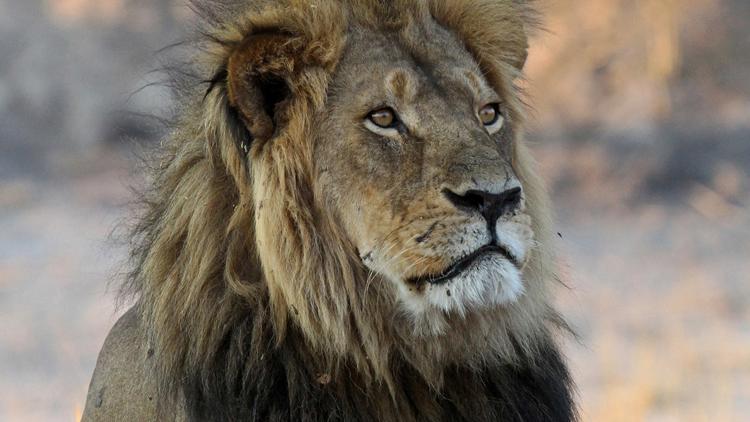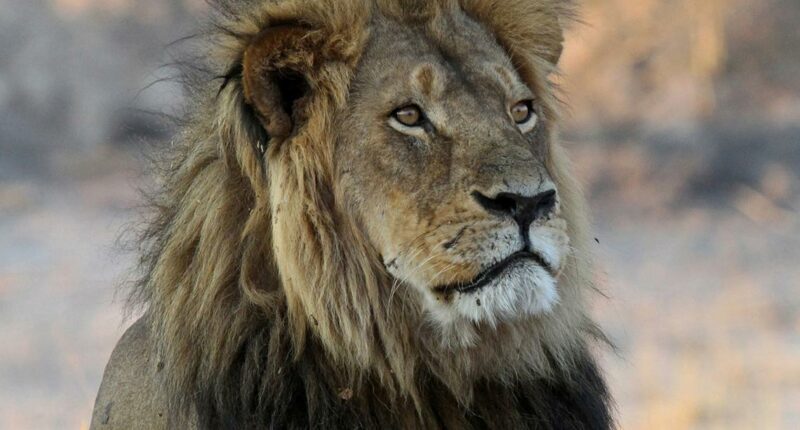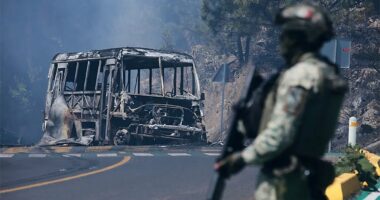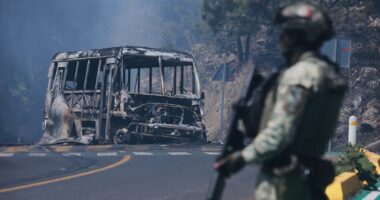Share this @internewscast.com

The lion, known as Blondie, was part of an Oxford University study and wore a research collar sponsored by Africa Geographic, a safari company.
HARARE, Zimbabwe — The shooting of a collared lion involved in a research study in Zimbabwe by a trophy hunter has been criticized by wildlife organizations, bringing back memories of the well-known case of Cecil the lion, who was killed by an American tourist in the same region ten years ago, causing a international backlash.
This latest lion, named Blondie, was part of a research project by Oxford University and had a tracking collar funded by Africa Geographic, a safari organization. According to Africa Geographic, Blondie was shot by a hunter in June near Zimbabwe’s Hwange National Park after being lured out of a protected zone into a nearby hunting area using bait.
As Blondie’s death sparked new protests against hunting, a representative from Zimbabwe’s National Parks told The Associated Press on Thursday that the hunt adhered to legal guidelines and the hunter had obtained the proper permits. Zimbabwe permits the hunting of up to 100 lions annually. Trophy hunters, generally from overseas, pay significant amounts, often in the tens of thousands of dollars, for the chance to hunt a lion and collect the head or skin as a keepsake.
Simon Espley, CEO of Africa Geographic, stated that Blondie’s death undermined the ethical standards trophy hunters claim to uphold because Blondie was wearing an easily noticeable research collar and was a prime breeding male. Hunters typically assert they focus on older, non-breeding lions.
Espley remarked, “The fact that Blondie’s distinctive collar did not stop him from being offered to a hunting client highlights the harsh truth that no lion is completely safe from trophy hunting.”
The issue of lion hunting is highly controversial, even among environmentalists. Some argue that if managed properly, hunting can generate funds that support conservation efforts. Others believe that wildlife should not be killed for sport at all.
Some countries in Africa like Kenya have commercial hunting bans, others like Zimbabwe and South Africa allow it. Botswana lifted a ban on hunting six years ago.
Tinashe Farawo, the spokesperson for the Zimbabwe parks agency, said money from hunting is crucial to support the southern African nation’s underfunded conservation efforts. He defended the hunt and said they often happen at night, meaning the collar on Blondie may not have been visible.
He said he had no information on Blondie being lured out of the park with bait — which is usually a dead animal — but there “is nothing unethical or illegal about that for anyone who knows how lions are hunted. This is how people hunt.”
“Our rangers were present. All paperwork was in order. Collars are for research purposes, but they don’t make the animal immune to hunting,” Farawo said. He declined to name the hunter.
Cecil’s killing in 2015 unleashed furious anger against Walter Palmer, a Minnesota dentist and trophy hunter who lured the lion out of the same national park in Zimbabwe and shot him with a bow before tracking him for hours and finally killing him. Cecil, whose head and skin were cut off and taken for trophies, was also involved in a research project by Oxford University.
Zimbabwe authorities initially said they would seek to extradite Palmer over the hunt, although that didn’t happen, while a hunting guide who helped him was arrested, only for charges to be dropped.
Zimbabwe’s national parks agency says the country makes about $20 million a year from trophy hunting, with a single hunter spending an average of $100,000 per hunt — which includes accommodation and hiring vehicles and local trackers.
Zimbabwe is home to approximately 1,500 wild lions, with around one-third of them living in the vast Hwange National Park. Across Africa, the wild lion population is estimated at around 20,000. However, their numbers are decreasing due to habitat loss and human conflict. Lions, one of Africa’s most iconic species, are currently listed as vulnerable by the International Union for Conservation of Nature.
Copyright 2025 Associated Press. All rights reserved. This material may not be published, broadcast, rewritten, or redistributed.

















